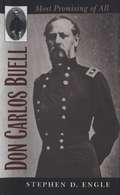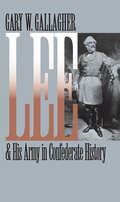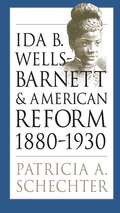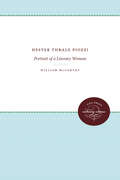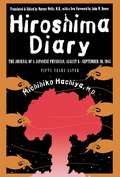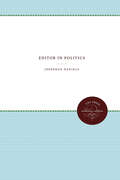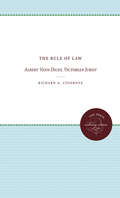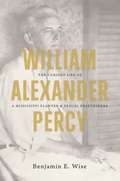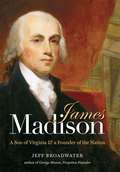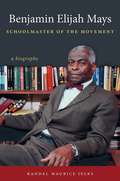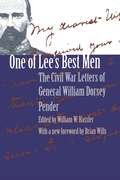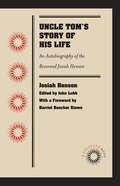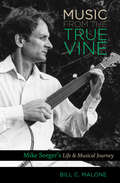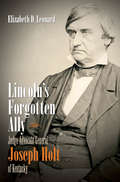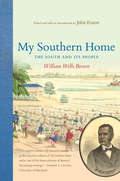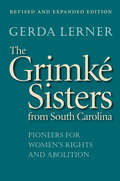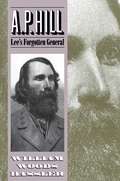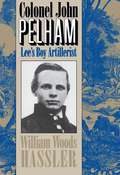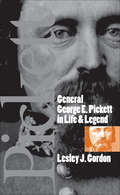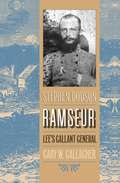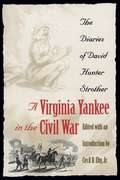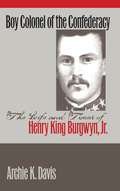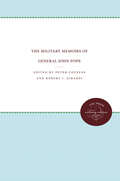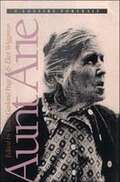- Table View
- List View
Don Carlos Buell
by Stephen D. EngleMajor General Don Carlos Buell stood among the senior Northern commanders early in the Civil War, led the Army of the Ohio in the critical Kentucky theater in 1861-62, and helped shape the direction of the conflict during its first years. Only a handful of Northern generals loomed as large on the military landscape during this period, and Buell is the only one of them who has not been the subject of a full-scale biography.A conservative Democrat, Buell viewed the Civil War as a contest to restore the antebellum Union rather than a struggle to bring significant social change to the slaveholding South. Stephen Engle explores the effects that this attitude--one shared by a number of other Union officers early in the war--had on the Northern high command and on political-military relations. In addition, he examines the ramifications within the Army of the Ohio of Buell's proslavery leanings.A personally brave, intelligent, and talented officer, Buell nonetheless failed as a theater and army commander, and in late 1862 he was removed from command. But as Engle notes, Buell's attitude and campaigns provided the Union with a valuable lesson: that the Confederacy would not yield to halfhearted campaigns with limited goals.
Lee and His Army in Confederate History
by Gary W. GallagherWas Robert E. Lee a gifted soldier whose only weaknesses lay in the depth of his loyalty to his troops, affection for his lieutenants, and dedication to the cause of the Confederacy? Or was he an ineffective leader and poor tactician whose reputation was drastically inflated by early biographers and Lost Cause apologists? These divergent characterizations represent the poles between which scholarly and popular opinion on Lee has swung over time. Now, in eight essays, Gary Gallagher offers his own refined thinking on Lee, exploring the relationship between Lee's operations and Confederate morale, the quality of his generalship, and the question of how best to handle his legacy in light of the many distortions that grew out of Lost Cause historiography.Using a host of contemporary sources, Gallagher demonstrates the remarkable faith that soldiers and citizens maintained in Lee's leadership even after his army's fortunes had begun to erode. Gallagher also engages aspects of the Lee myth with an eye toward how admirers have insisted that their hero's faults as a general represented exaggerations of his personal virtues. Finally, Gallagher considers whether it is useful--or desirable--to separate legitimate Lost Cause arguments from the transparently false ones relating to slavery and secession. Was Robert E. Lee a gifted soldier whose only weaknesses lay in the depth of his loyalty to his troops, affection for his lieutenants, and dedication to the cause of the Confederacy? Or was he an ineffective leader and poor tactician whose reputation was drastically inflated by early biographers and Lost Cause apologists? These divergent characterizations represent the poles between which scholarly and popular opinion on Lee has swung over time. In eight essays, Gary Gallagher offers his own refined thinking on Lee, exploring the relationship between Lee's operations and Confederate morale, the quality of his generalship, and the question of how best to assess his legacy in light of the many distortions that grew out of Lost Cause historiography.-->
Ida B. Wells-Barnett and American Reform, 1880-1930
by Patricia A. SchechterPioneering African American journalist Ida B. Wells-Barnett (1862-1931) is widely remembered for her courageous antilynching crusade in the 1890s; the full range of her struggles against injustice is not as well known. With this book, Patricia Schechter restores Wells-Barnett to her central, if embattled, place in the early reform movements for civil rights, women's suffrage, and Progressivism in the United States and abroad. Schechter's comprehensive treatment makes vivid the scope of Wells-Barnett's contributions and examines why the political philosophy and leadership of this extraordinary activist eventually became marginalized. Though forced into the shadow of black male leaders such as W. E. B. Du Bois and Booker T. Washington and misunderstood and then ignored by white women reformers such as Frances E. Willard and Jane Addams, Wells-Barnett nevertheless successfully enacted a religiously inspired, female-centered, and intensely political vision of social betterment and empowerment for African American communities throughout her adult years. By analyzing her ideas and activism in fresh sharpness and detail, Schechter exposes the promise and limits of social change by and for black women during an especially violent yet hopeful era in U.S. history.
Hester Thrale Piozzi: Portrait of a Literary Woman
by William McCarthyMuch has been written about Thrale, friend and hostess of Samuel Johnson, but this is the first study to focus on Piozzi as the writer. In his narrative of her life, McCarthy draws on a large body of published and unpublished sources to map Piozzi's literary development, define her literary identity, and evaluate her achievement. In addition to reexamining her best-known works, he present the first serious treatment of her poetry, political works, and historical writings.Originally published in 1985.A UNC Press Enduring Edition -- UNC Press Enduring Editions use the latest in digital technology to make available again books from our distinguished backlist that were previously out of print. These editions are published unaltered from the original, and are presented in affordable paperback formats, bringing readers both historical and cultural value.
Hiroshima Diary
by Michihiko HachiyaThe late Dr. Michihiko Hachiya was director of the Hiroshima Communications Hospital when the world's first atomic bomb was dropped on the city. Though his responsibilities in the appalling chaos of a devastated city were awesome, he found time to record the story daily, with compassion and tenderness. His compelling diary was originally published by the UNC Press in 1955, with the help of Dr. Warner Wells of the University of North Carolina at Chapel Hill, who was a surgical consultant to the Atomic Bomb Casualty Commission and who became a friend of Dr. Hachiya. In a new foreword, John Dower reflects on the enduring importance of the diary fifty years after the bombing.
Tar Heel Editor
by Josephus DanielsBorn during the Civil War, Josephus Daniels has lived a remarkably full life and played a substantial part in one of the most significant periods of our nation's history. This volume of the autobiography of Wilson's secretary of the navy covers the period up to the year 1893 and is concerned with his early interests, his schooling, and his early ventures into the field of journalism.Originally published in 1939.A UNC Press Enduring Edition -- UNC Press Enduring Editions use the latest in digital technology to make available again books from our distinguished backlist that were previously out of print. These editions are published unaltered from the original, and are presented in affordable paperback formats, bringing readers both historical and cultural value.
Editor in Politics
by Josephus DanielsThis volume, rich in its first-hand knowledge of men and events, begins with the years of Cleveland's second administration, covers the meteoric rise of Bryan, and ends with Josephus Daniels's appointment as secretary of the navy under Wilson. Among the more dramatic incidents in the book is the account of the Democratic National Convention of 1896, in which Bryan was a key candidate.Originally published in 1941.A UNC Press Enduring Edition -- UNC Press Enduring Editions use the latest in digital technology to make available again books from our distinguished backlist that were previously out of print. These editions are published unaltered from the original, and are presented in affordable paperback formats, bringing readers both historical and cultural value.
The Rule of Law: Albert Venn Dicey, Victorian Jurist (Studies in Legal History)
by Richard A. CosgroveSo commonplace has the term rule of law become that few recognize its source as Dicey's Introduction to the Study of the Law of the Constitution. Cosgrove examines the life and career of Dicey, the most influential constitutional authority of late Victorian and Edwardian Britain, showing how his critical and intellectual powers were accompanied by a simplicity of character and wit. Dicey's contribution to the history of law is described as is his place in Victorian society.Originally published 1980.A UNC Press Enduring Edition -- UNC Press Enduring Editions use the latest in digital technology to make available again books from our distinguished backlist that were previously out of print. These editions are published unaltered from the original, and are presented in affordable paperback formats, bringing readers both historical and cultural value.
William Alexander Percy
by Benjamin E. WiseIn this evocative biography, Benjamin E. Wise presents the singular life of William Alexander Percy (1885-1942), a queer plantation owner, poet, and memoirist from Mississippi. Though Percy is best known as a conservative apologist of the southern racial order, in this telling Wise creates a complex and surprising portrait of a cultural relativist, sexual liberationist, and white supremacist.We follow Percy as he travels from Mississippi around the globe and, always, back again to the Delta. Wise's exploration brings depth and new meaning to Percy's already compelling life story--his prominent family's troubled history, his elite education and subsequent soldiering in World War I, his civic leadership during the Mississippi River flood of 1927, his mentoring of writers Walker Percy and Shelby Foote, and the writing and publication of his classic autobiography, Lanterns on the Levee. This biography sets Percy's life and search for meaning in the context of his history in the Deep South and his experiences in the gay male world of the early twentieth century. In Wise's hands, these seemingly disparate worlds become one.
James Madison
by Jeff BroadwaterJames Madison is remembered primarily as a systematic political theorist, but this bookish and unassuming man was also a practical politician who strove for balance in an age of revolution. In this biography, Jeff Broadwater focuses on Madison's role in the battle for religious freedom in Virginia, his contributions to the adoption of the Constitution and the Bill of Rights, his place in the evolution of the party system, his relationship with Dolley Madison, his performance as a wartime commander in chief, and his views on slavery. From Broadwater's perspective, no single figure can tell us more about the origins of the American republic than our fourth president.In these pages, Madison emerges as a remarkably resilient politician, an unlikely wartime leader who survived repeated setbacks in the War of 1812 with his popularity intact. Yet Broadwater shows that despite his keen intelligence, the more Madison thought about one issue, race, the more muddled his thinking became, and his conviction that white prejudices were intractable prevented him from fully grappling with the dilemma of American slavery.
Benjamin Elijah Mays, Schoolmaster of the Movement
by Randal Maurice JelksIn this first full-length biography of Benjamin Mays (1894-1984), Randal Maurice Jelks chronicles the life of the man Martin Luther King Jr. called his "spiritual and intellectual father." Dean of the Howard University School of Religion, president of Morehouse College, and mentor to influential black leaders, Mays had a profound impact on the education of the leadership of the black church and of a generation of activists, policymakers, and educators. Jelks argues that Mays's ability to connect the message of Christianity with the responsibility to challenge injustice prepared the black church for its pivotal role in the civil rights movement. From Mays's humble origins in Epworth, South Carolina, through his doctoral education, his work with institutions such as the National Urban League, the NAACP, and the national YMCA movement, and his significant career in academia, Jelks creates a rich portrait of the man, the teacher, and the scholar. Benjamin Elijah Mays, Schoolmaster of the Movement is a powerful portrayal of one man's faith, thought, and mentorship in bringing American apartheid to an end.
One of Lee's Best Men
by William W. HasslerOn the day that Lincoln was inaugurated in 1861, twenty-seven-year-old William Dorsey Pender, en route to the provisional Confederate capital in Montgomery, Alabama, hurriedly scribbled a note to his wife, Fanny. So began a prolific correspondence between a rising Confederate officer and his cherished wife that would last until Pender was mortally wounded at Gettysburg.First published by UNC Press in 1965, Pender's letters are filled with personal details, colorful descriptions, and candid opinions of such important figures as Robert E. Lee, Stonewall Jackson, J. E. B. Stuart, and A. P. Hill. His comments on his military activities and aspirations and the challenges of command, combined with his husbandly advice and affection, sketch an intimate and unvarnished portrait of the man who was perhaps the most distinguished North Carolina commander.
Uncle Tom's Story of His Life
by Josiah HensonThis 1876 version of Josiah Henson's autobiography, the first of many editions issued by British editor John Lobb, followed the original 1849 edition and a much-expanded 1858 version. The autobiography traces Henson's life from his birth into slavery in Maryland in 1789; his escape to Canada in 1830; his participation in the founding of the Dawn Settlement for fugitive slaves in Ontario; and his several trips to England to raise funds for the settlement. Henson, who in his later years toured as the model for the Uncle Tom of Harriet Beecher Stowe's novel, describes his meeting with Stowe in 1852 and draws parallels between the histories of other Uncle Tom's Cabin characters and his own acquaintances. While Stowe herself stressed that there was no single model for her title character, she called Henson a "parallel instance" for Uncle Tom in A Key to Uncle Tom's Cabin. Reprinted multiple times in the United States and Britain in the nineteenth century and translated into several other languages, Henson's autobiography continues to reward readers with its descriptions not only of slave life in Maryland and Kentucky, but also of the business and educational ventures of escaped slaves in Ontario.
Music from the True Vine: Mike Seeger's Life and Musical Journey
by Bill C. MaloneA musician, documentarian, scholar, and one of the founding members of the influential folk revival group New Lost City Ramblers, Mike Seeger (1933-2009) spent more than fifty years collecting, performing, and commemorating the culture and folk music of white and black southerners, which he called "music from the true vine. " In this fascinating biography, Bill Malone explores the life and musical contributions of folk artist Seeger, son of musicologists Charles and Ruth Crawford Seeger and brother of folksingers Pete and Peggy Seeger. Malone argues that Seeger, while not as well known as his brother, may be more important to the history of American music through his work in identifying and giving voice to the people from whom the folk revival borrowed its songs. Seeger recorded and produced over forty albums, including the work of artists such as Libba Cotton, Tommy Jarrell, Dock Boggs, and Maybelle Carter. In 1958, with an ambition to recreate the southern string bands of the twenties, he formed the New Lost City Ramblers, helping to inspire the urban folk revival of the sixties. Music from the True Vinepresents Seeger as a gatekeeper of American roots music and culture, showing why generations of musicians and fans of traditional music regard him as a mentor and an inspiration.
Lincoln's Forgotten Ally: Judge Advocate General Joseph Holt of Kentucky
by Elizabeth D. LeonardJoseph Holt, the stern, brilliant, and deeply committed Unionist from Kentucky, spent the first several months of the American Civil War successfully laboring to maintain Kentucky's loyalty to the Union, then went on to serve as President Lincoln's judge advocate general. InLincoln's Forgotten Ally, Elizabeth Leonard offers the first full-scale biography of Holt, who has long been overlooked and misunderstood by historians and students of the war. In his capacity as the administration's chief arbiter and enforcer of military law, Holt strove tenaciously, often against strong resistance, to implement Lincoln's wartime policies, including emancipation. After Lincoln's assassination, Holt accepted responsibility for pursuing and bringing to justice everyone involved in John Wilkes Booth's conspiracy. It was because of this role, in which he is often portrayed as a brutal prosecutor, and because of his hard position toward the South, Leonard contends, that Holt's reputation suffered. Leonard argues, however, that Holt should not be defined by what Southern sympathizers and proponents of the Lost Cause came to think of him. Lincoln's Forgotten Allyseeks to restore Holt, who dedicated both his energy and his influence to ensuring that the Federal victory would bring about lasting positive change for the nation, to his rightful place in American memory.
My Southern Home
by William Wells BrownThe culmination of William Wells Brown's long writing career,My Southern Homeis the story of Brown's search for a home in a land of slavery and racism. Brown (1814-84), a prolific and celebrated abolitionist and writer often recognized as the first African American novelist for hisClotel(1853), was born enslaved in Kentucky and escaped to Ohio in 1834. In this comprehensive edition, John Ernest acts as a surefooted guide to this seminal work, beginning with a substantial introduction placing Brown's life and work in cultural and historical context. Brown addresses from a post-emancipation vantage point his early experiences and understanding of the world of slavery and describes his travels through many southern states. The text itself is presented in its original form, while Ernest's annotations highlight its layered complexity and document the many instances in which Brown borrows from his own earlier writings and the writings of others to form an underlying dialogue. This edition sheds new light on Brown's literary craft and provides readers with the maps they need to follow Brown on his quest for home in the chaotic social landscape of American southern culture in the final decades of the nineteenth century.
The Grimké Sisters from South Carolina
by Gerda LernerA landmark work of women's history originally published in 1967, Gerda Lerner's best-selling biography of Sarah and Angelina Grimke explores the lives and ideas of the only southern women to become antislavery agents in the North and pioneers for women's rights. This revised and expanded edition includes two new primary documents and an additional essay by Lerner. In a revised introduction Lerner reinterprets her own work nearly forty years later and gives new recognition to the major significance of Sarah Grimke's feminist writings.
A. P. Hill
by William W. HasslerA. P. Hill: Lee's Forgotten General is the first biography of the Confederacy's long-neglected hero whom Lee ranked next to Jackson and Longstreet. Although the name and deeds ot this gallant Virginian conspicuously punctuate the record of every major campaign of the Army of Northern Virginia, the man himself has persistently remained what Douglas Southall Freman termed an "elusive personality." William Woods Hassler, through careful and persistent research, has compiled an interesting documentary study from which emerges a balanced portrait of this distinguished but complex character.Here for the first time is detailed the romantic triangle which enmeshed Hill and McClellan, former roommates at West Point, with beauteous Nelly Marcy, reigning queen of pre-war Washington's younger set. Hill lost this contest to Nelly's parents, but he later won the hand of General John Hunt Morgan's lovely and talented sister, Dolly. And at Sharpsburg, Hill wreaked vengeance upon McClellan by his timely arrival which saved Lee from defeat at the same time it spelled McClellan's subsequent dismissal from command of the Army of the Potomac.The author traces Hill's meteoric rise from Colonel of the redoubtable Thirteenth Virginia Regiment to Major General in command of the famed Light Division. Against a "you are there" background of intimate detail, the reader follows the exploits of tempestous Ambrose Powell Hill as he welds his officers and men into fierce striking units. Where the fighing is thickests there is the red-haired, red-shirted Hill brandishing his sword and exhorting his men to victory. Sometimes the issue ends ignominiously as at Bristoe Station, but more often the outcome is glorious as at Second Manassas and Reams Station.Gray greats and near-greats stalk through these pages with vivid reality as one meets Jeb Stuart, Dorsey Pender, John Hood, Heros von Borcke, Ham Chamerlayne, Willie Pegram, Rev. J. Wm. Jones, Cadmus Wilcox, Harry Heth, J. R. Anderson, Lawrence O'Brien Branch, James Archer, Jim Lane, Thomas Wooten, Charles Field, George Tucker, Kyd Douglas, Johnston Pettigrew, Moxley Sorrel, William H. Palmer, Wade Hampton, Jube Early, Lindsay Walker, Maxcy Gregg, Sam McGowan, and others.Accompanying Hill and his commands from pre-Manassas to the final breakthrough at Petersburg, the reader relives the campaigns in the Eastern theater. At the same time the reader gains a deeper insight into the problems of command, together with an appreciation of the hardships which the Confederate soldiers endured during even the early days of the conflict.Although Powell Hill's consideration and ability won for him the unbounded respect and devotion of his troops, his proud, sensitive nature continually embroiled him with his superiors. His dispute with Longstreet following the Seven Days Battles almost culminated in a duel. Transferred to Jackson's command, Hill outspokenly quarreled with "Old Jack" until the latter's mortal wounding at Chancellorsville effected a dramatic battlefield reconciliation. As Jackson's successor, Hill performed irregularly. The author analyzes objectively the various factors which may have caused the changes in Hill's fortunes following his elevation to corps command.
Colonel John Pelham
by William W. HasslerEven before the end of the Civil War Colonel John Pelham had become a legendary figure of the Confederacy. General Lee called him "the gallant Pelham," and on seeing the young artillerist employ but a single gun to hold up the advance of three Union divisions and over a hundred guns at Fredericksberg, he exclaimed: "It is glorious to see such courage in one so young.""Stonewall" Jackson, who relied implicitly on Pelham in tight situations said: "It is really extraordinary to find such nerve and genius in a mere boy. With a Pelham on each flank I believe I could whip the world.""Jeb" Stuart, the dashing cavalry chief, claimed that "John Pelham exhibited a skill and courage which I have never seen surpassed. I loved him as a brother."Major John Esten Cooke, a fellow-officer and tent-mate, wrote: "He is the bravest human being I ever saw in my life."And one of Pelham's veteran gunners asserted: "We knew him -- we trusted him -- we would have followed him anywhere, and did."Shortly after the outbreak of hostilities in the spring of 1861, Cadet Pelham slipped away from West Point to join the Confederacy. Following the fierce Battle of First Manassas, in which he fought side-by-side with "Stonewall" Jackson, Pelham was assigned to "Jeb" Stuart's command with orders to organize the Stuart Horse Artillery. This mounted unit -- dashing from action to action on the battlefield -- provided General Lee's army with invaluable mobile firepower which saved many desperate situations.In over sixty battles Pelham's blazing guns saw furious action against Union infantry, cavalry, artillery, gunboats and even locomotives. Although he fought against tremendous odds, Pelham never lost an artillery duel or a single gun!Colonel Pelham was an outstanding figure on the battlefield and off. The modest, boyish-looking commander of the Horse Artillery was as calm and popular with his gunners under fire as he was with beautiful Southern belles in the ballroom. This action-packed book fully describes the incredible feats of the adventurous, romantic artillery genius of the Confederacy.
General George E. Pickett in Life and Legend
by Lesley J. GordonThe man who gave his name to the greatest failed frontal attack in American military history, George E. Pickett is among the most famous Confederate generals of the Civil War. But even today he remains imperfectly understood, a figure shrouded in Lost Cause mythology. In this carefully researched biography, Lesley Gordon moves beyond earlier studies of Pickett. By investigating the central role played by his wife LaSalle in controlling his historical image, Gordon illuminates Pickett's legend as well as his life. After exploring Pickett's prewar life as a professional army officer trained at West Point, battle-tested in Mexico, and seasoned on the western frontier, Gordon traces his return to the South in 1861 to fight for the Confederacy. She examines his experiences during the Civil War, including the famed, but failed, charge at the battle of Gettysburg, and charts the decline in his career that followed. Gordon also looks at Pickett's marriage in 1863 to LaSalle Corbell, like him a child of the Virginia planter elite. Though their life together lasted only twelve years, LaSalle spent her five decades of widowhood writing and speaking about her husband and his military career. Appointing herself Pickett's official biographer, she became a self-proclaimed authority on the war and the Old South. In fact, says Gordon, LaSalle carefully and deliberately created a favorable image of her husband that was at odds with the man she had married."Lesley Gordon's study of George E. Pickett explores the reality of the general's life as well as its romanticized version that survived through the generations. . . . Excellent military history informed by recent scholarship in social history, General George E. Pickett in Life and Legend provides a sophisticated analysis of one of the Civil War's most memorable figures."--Journal of Southern History"Insightful and judicious, sometimes unconventional, and combining a clear narrative thread with a persuasive analysis of available evidence, [this] biography is a convincing assessment of George Pickett's place in Confederate history, an intriguing examination of his--and LaSalle's--character and personality, and a valuable look at the Pickett of legend."--Civil War History"The novelty of this elegantly written book resides in the degree to which Gordon, rather than relying heavily on LaSalle, complaining about her, or both, as previous researchers have done, carefully sifts through her various accounts and separates fact from fiction--and suggests the truths that reside in fiction."--Journal of American HistoryThe man who gave his name to the greatest failed frontal attack in American military history, George E. Pickett is among the most famous Confederate generals of the Civil War. But even today he remains imperfectly understood, a figure shrouded in Lost Cause mythology. In this carefully researched biography, Lesley Gordon moves beyond earlier studies of Pickett. By investigating how Pickett's wife LaSalle, who outlived her husband by five decades, helped control his historical image, Gordon illuminates Pickett's legend as well as his life. -->
Stephen Dodson Ramseur
by Gary W. GallagherStephen Dodson Ramseur, born in Lincolnton, North Carolina, in 1837, compiled an enviable record as a brigadier in the Army of Northern Virginia. Commissioned major general the day after his twenty-seventh birthday, he was the youngest West Pointer to achieve that rank in the Confederate army. He later showed great skill as a divisional leader in the 1864 Shenandoah Valley campaigns before he was fatally wounded at Cedar Creek on 19 October of that year. Based on Ramseur's extensive personal papers as well as on other sources, this absorbing biography examines the life of one of the South's most talented commanders and brings into sharper focus some of the crosscurrents of this turbulent period.
A Virginia Yankee in the Civil War
by Cecil D. EbyThe Civil War diaries of David Hunter Strother, known better to his contemporaries as "Porte Crayon," chronicle his three years of service in the Union army with the same cogency and eye for detail that made him one of the most popular writers and illustrators in America in his time. A Virginian strongly opposed to secession, Strother joined the Federal army as a civilian topographer in July of 1861 and was soon commissioned, rising eventually to the rank of brigadier general. He served under a succession of commanders, including Generals Patterson, Banks, Pope, and McClellan, winning their respect as well as their confidence. First published by UNC Press in 1961, A Virginia Yankee in the Civil War is a fascinating firsthand record of the conflict and of the divided loyalties it produced that is further enlivened by Strother's remarkable humor and insight.
Boy Colonel of the Confederacy
by Archie K. DavisHenry King Burgwyn, Jr. (1841-63), one of the youngest colonels in the Confederate Army, died at the age of twenty-one while leading the twenty-sixth North Carolina regiment into action at the battle of Gettysburg. In this sensitive biography, originally published by UNC Press in 1985, Archie Davis provides a revealing portrait of the young man's character and a striking example of a soldier who selflessly fulfilled his duty. Drawing on Burgwyn's own letters and diary, Davis also offers a fascinating glimpseinto North Carolina society during the antebellum period and the Civil War.
The Military Memoirs of General John Pope (Civil War America)
by Peter Cozzens Robert I. GirardiUnion general John Pope was among the most controversial andmisunderstood figures to hold major command during the Civil War.Before being called east in June 1862 to lead the Army of Virginia against General Robert E. Lee, he compiled an enviable record in Missouri and as commander of the Army of the Mississippi. After his ignominious defeat at the Second Battle of Bull Run, he was sent to the frontier. Over the next twenty-four years Pope held important department commands on the western plains and was recognized as one of the army's leading authorities on Indian affairs, but he never again commanded troops in battle. In 1886, Pope was engaged by the National Tribune, aweekly newspaper published in Washington, D.C., to write a seriesof articles on his wartime experiences. Over the next five years, in twenty-nine installments, he wrote about the war as he had lived it. Collected here for the first time, Pope's "war reminiscences" join a select roster of memoirs written by Civil War army commanders. Pope presents a detailed review of the campaigns in which heparticipated and offers vivid character sketches of such illustrious figures as Abraham Lincoln and Secretary of War Edwin M. Stanton. Clearly written and balanced in tone, his memoirs are a dramatic and important addition to the literature on the Civil War.Originally published in 1998.A UNC Press Enduring Edition -- UNC Press Enduring Editions use the latest in digital technology to make available again books from our distinguished backlist that were previously out of print. These editions are published unaltered from the original, and are presented in affordable paperback formats, bringing readers both historical and cultural value.
Aunt Arie: A Foxfire Portrait
by Eliot Wigginton Linda Garland PageOf all the people documented by the Foxfire students since 1966, none has been more appealing to readers than Arie Carpenter. For all those who have read and cherished the Foxfire books, here is a loving portrait of a fondly remembered friend. This book is not just about Aunt Arie; it is Aunt Arie. In her own words, she discusses everything from planting, harvesting, and cooking to her thoughts about religion and her feelings about living alone. Also included are testimonials from many who knew her and a wealth of photographs.
